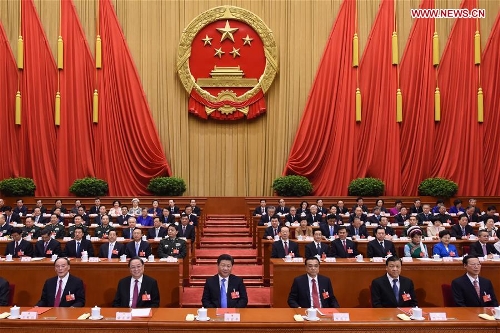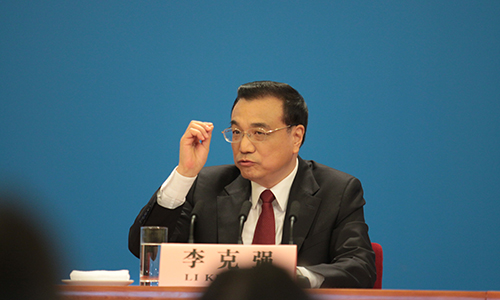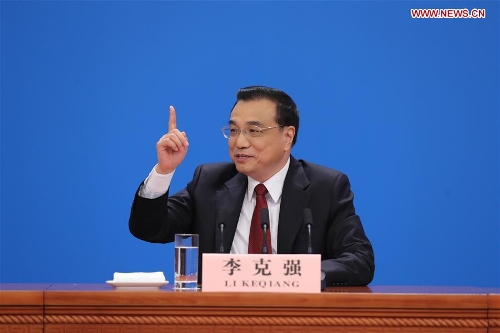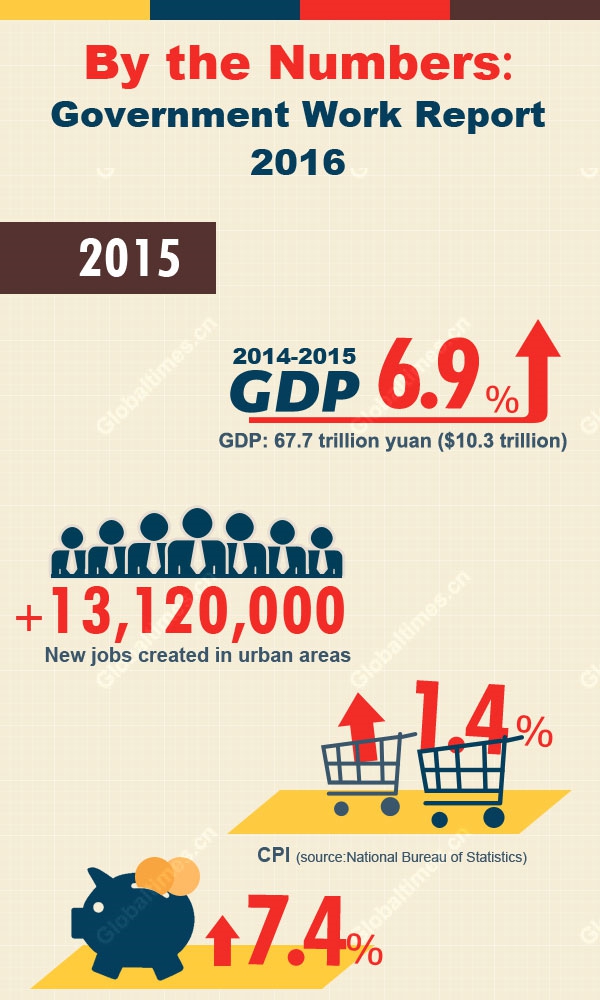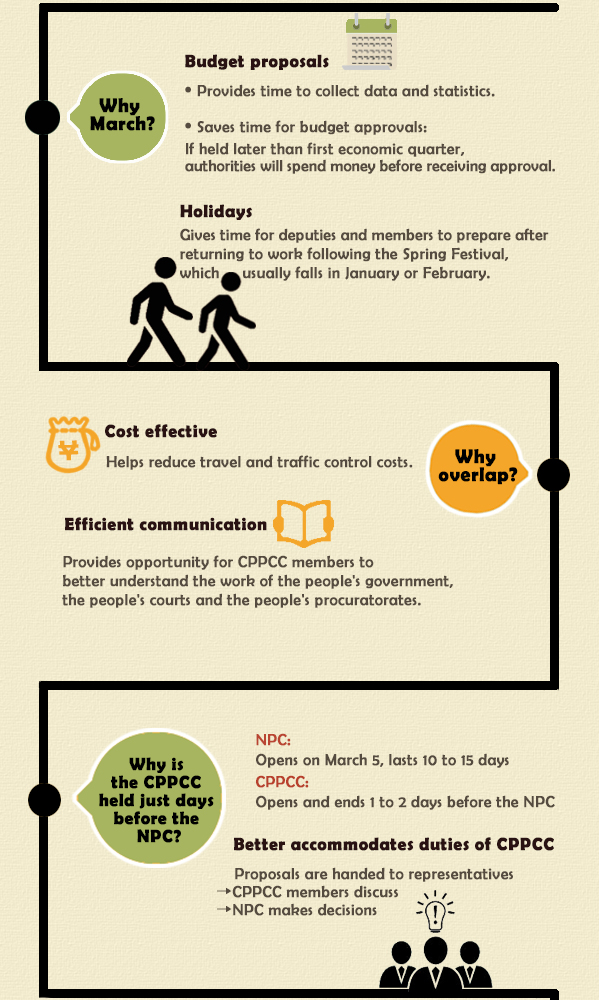NPC & CPPCC Sessions 2016
| Latest Updates |
- China vows frontier boom 2016-3-18 1:18:01
- Deputies urged to polish proposals 2016-3-18 0:53:01
- Report on the Work of the Government (14) 2016-3-17 22:54:39
- Report on the Work of the Government (13) 2016-3-17 21:42:42
- Report on the Work of the Government (12) 2016-3-17 21:41:47
- Report on the Work of the Government (11) 2016-3-17 21:41:26
| Highlight Topics |
 The "13th Five-Year Plan"
The "13th Five-Year Plan"Goals, missions of China's new five-year plan
China to build 50 more airports in 13th Five-year Plan: Minister of Transport
13th Five-Year Plan considers grassroots wisdom
Five-year plan to benefit Hong Kong, Macao
Premier solicits opinions on gov't work report, 13th Five-Year Plan
Five-Year Plan tackles rebalancing issues
 Charity law
Charity lawChina tackles first philanthropy law
China's first charity bill bans charity groups from harming state security
China's first charity bill submitted to national legislature
 Defense budget
Defense budgetPLA budget slowdown meets needs of times
Defense budget hike likely
 Anti-graft
Anti-graftShanxi Party chief vows all-out anti-graft drive for Party discipline
 Anti-terrorism
Anti-terrorismChina supports anti-terror cooperation among SCO members
Xinjiang govt stresses border control, law on anti-terrorism
 Second child
Second childFamily pressure to have second children drives mothers to drop careers
Health official denies requiring couples to pay ‘second child deposit’
 Poverty reduction campaign
Poverty reduction campaignChewing on the hard bones of China's poverty
China punishes over 35,000 for poverty relief corruption
 "Belt and Road" initiative
"Belt and Road" initiativeHK to further explore role in Belt and Road Initiative
Gansu offers scholarships to students from Belt and Road
 Supply-side reform
Supply-side reformSOE reform, financial risk prevention seen as key issues
Supply-side reform a recipe for China's economic rebalancing
 Possible revise on the charity law
Possible revise on the charity lawChina seeks public opinion on draft charity law
Calls for new charity law to ban tobacco donations
 Green development
Green developmentClimate adaptation activities insufficient in developing cities: study
China's consumption tax on oil may be high, but environmental issue also matters
| By the Numbers |
Why China needs defense budget raise?
For the moment, the country is trying to improve its defense power to match China's prosperity, major power status, and to cope with current situation of international politics and military affairs more calmly via national defense and military reforms.
All this demands that our defense budget should keep an appropriate pace of growth both now and in the future. This year, for example, the military budget in certain fields needs increasing.
Mass layoffs won’t happen
The central government will allocate 100 billion yuan ($15.33 billion) to resettle workers retrenched as part of the nation's drive to reduce overcapacity, Premier Li Keqiang said in his government work report.It should also be noted that being retrenched is a painful experience, and this new round of layoffs involves not only workers in the State sector but also in private enterprise, which will require efforts beyond fiscal support.
Lower growth target shows new economic priorities
The target allows the government to shift away from solely pursuing GDP growth, and wholly alters the former idea of aiming for extensive but inefficient growth. This could fundamentally change the government's behavioral pattern and policy direction, paving the way for China to head for higher quality and improved efficiency in its growth, and also making room for bold reforms and economic restructuring.
China’s promising, reality-based economic future
We need to review the context of this 6.5 to 7 percent growth rate. It is a slowing-down after three decades of rapid development. The world's second largest economy of over $10 trillion is still growing, while the highest growth rate for the world's other top five economies is less than three percent, or even negative.
RRR cut shows focus may be changing from yuan stability to boosting China’s economy
The People's Bank of China (PBC) surprised the market on Monday by announcing an RRR cut of 0.5 percentage points starting from March 1. This measure had previously been generally expected by the market, but that was before the central bank pumped liquidity into the interbank market in late January through its open market operations (OMOs), which was seen as reducing the likelihood of an RRR cut at that time.
Growth of shopping via mobile devices fuelling development in e-commerce, finance
Since online sales now account for almost 11 percent of overall sales in China, online shopping has become a significant channel for consumption.
| FM Press Conference |
6 tough questions on China’s foreign policy
Global Times (China): Should war ever break out on the Korea Peninsula, would China fight the US and assist the DPRK?
Wang Yi: Only denuclearization can bring peace, only dialogue can provide a way out, and only cooperation can bring win-win results.
Reuters (UK): Is China trying to hide something in the South China Sea, as China has so far not permitted any foreigners to visit its islands in the South China Sea?
Wang Yi: People talk a lot about militarization. I think China can not be accused of militarization. The label is more suited to some other countries.
Building defense facilities on its own islands and reefs, China is actually exercising the rights of self-preservation and self-defense.
China is not just building necessary defense facilities on the Nansha islands and reefs. More importantly, we are building up civilian facilities, and we will provide public goods to the international community. Once they are completed and the conditions are right, we will of course consider inviting journalists, including foreign journalists, to visit the islands and reefs.
CNN (US): How would China response to the ruling of the arbitration case initiated by the Philippines against China, which is expected in May?
Wang Yi: China is acting fully in line with the law by not accepting the South China Sea arbitration filed by the Philippines.
By not accepting the arbitration case, the Chinese government is acting entirely in accordance with the law, while the Philippines' act is unlawful, unfaithful and unreasonable, he said.
The stubbornness of the Philippines is clearly the result of behind-the-scene instigations and political manipulation, he added.
Lianhe Zaobao (Singapore): Does China want to overhaul the international order and build an influence that can rival that of the US?
Wang Yi: China is not trying to build up a rival system, on the contrary, we are trying to play a bigger role in the existing international order. Of course, as China grows in strength, we need reasonable development space and a corresponding say in international affairs. In my view, this is something quite normal.
China Radio International: How does China view the prospect of China-US relations?
Wang Yi: The source of friction between China and the US is that some in the US have strategic suspicions about China, worrying that China will surpass the US one day.
Mainichi Shimbun (Japan): How do you see current China-Japan relations? And if not too optimistic, what are the underlying problems in the relationship? Can you suggest some things that both sides can do to improve the situation?
Wang Yi: Thanks to the efforts of wise people on both sides, there are signs of improvement in China-Japan relations, but there is little ground for optimism. In China-Japan relations, the underlying problem is that the Japanese politicians in power have wrong perceptions about China. The Japanese side should give serious thought to whether a growing China should be viewed as a friend or foe, as a partner or adversary.
| NPC Press Conference |
Fu Ying, spokeswoman for the fourth Session of the 12th National People's Congress (NPC)
On defense budget
China will raise its defense budget by seven to eight percent in 2016, compared with last year's 10.1 percent. See more click here.
On China's population policy
China's population policy change is timely and proper as the nationwide two-child policy took effect on Jan. 1.
The exact figure will be published on March 5 in a budget report to the session.
A growth rate within the range that Fu mentioned might be the lowest for years since 2010, when the figure stood at 7.5 percent.
On philanthropy in China
Philanthropy is developing fast in China and the nation aims to standardize it through a charity law.
On China's filmmaking
There is a consensus among filmmakers and censors that there should be clearer lines for China's filmmaking, and that the censorship system should be open and transparent.
| Infographics |
By the Numbers: Government work report
Chinese Premier Li Keqiang delivers a government work report during the opening meeting of the fourth session of the 12th National People's Congress at the Great Hall of the People in Beijing, capital of China, March 5, 2016.
Eight issues in spotlight at the two sessions
Eight issues in spotlight at the two sessions
Timing the two sessions
This year marks the 18th consecutive time the two sessions
are held on March 3 and 5. Originally with no fixed date,
the annual event was given its designated time slot
during the 8th National People’s Congress in the late 1990s.
But what are the reasons behind the scheduling?
Global Times investigates.
| Comments & Quotes |
- Han Changfu, Minister of Agriculture of China
"The term "utilizing wild animals" should be deleted from China's first proposed amendment to its wildlife protection law."
- Mang Ping, professor of environmental ethics at the Central Institute of Socialism
"Some proposals are expected to focus on supply-side reform, with the goal of generating sustainable growth."
- Xu Hongcai, director of the economic research department at the China Center for International Economic Exchanges
I was impressed by the reference of promoting democracy and harmony in Hong Kong in the 13th Five-Year Plan.
Serious topics dominate two sessions newsAs 1.3 billion people closely watch the thousands of deputies and members gather in Beijing, they need to be assured that their concerns are being taken care of, and the ...
China should make greater use of IT to tackle povertyChina has been battling poverty for decades, and as part of its current efforts, the country is looking to IT as a growing source of help.
More| Two Sessions Q & A |
What are powers of NPC?
What's the difference between NPC motions and CPPCC proposals?
How are NPC deputies elected?
Roles and functions of Chinese People's Political Consultative Conference
